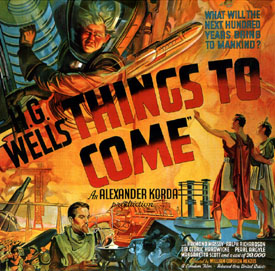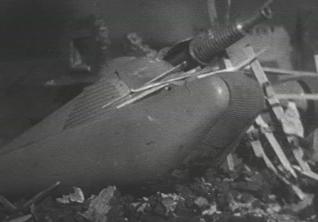
Going through a few boxes in the crawl space, I came across my copy of the movie "Things to Come". I must confess, the copy I have came from the Dollar Store, so we're not talking pristine cut. In fact, a better version of the movie can be watched on YouTube. A big thank you to the person who posted this amazing movie.
There's a lot to impress while watching. First of all, as you know, the screenplay was written by the author, H.G. Wells, so obviously it's going to be very true to the book, if not a literal rendition, then certainly the spirit of the book. It's impressive because, even though it was written and premiered three years before WW2, gives us a pretty good interpretation of the blitzkrieg and the concept of Total War. What is important, besides the armies, is the air force. You might remember my blog article about total war and what was vital to the planning and theorizing of the military was air control. In fact the concept of total war cannot happen unless there is air power. The main city, Everytown, is attacked from the air and besides bombardment of bombs, there is gas. While this did not happen during the London Blitz, that is the gas, there was constant bombardment. The city does not do well, as was the case of almost every major city in UK, Germany, Japan and the rest of the world where the war was fought.
I was reading some of the comments about the movie and one person said that the scene of the attack on Everytown was greeted with laughter, none of the audience could believe such a thing was possible. I wonder if any of them remembered that scene as they ran to the bomb shelters.
Then there is the art deco tanks:

and the cool planes, plus uniforms:

What is interesting is as the war continues, civilization and technology breaks down. From art deco tanks to horses and simple guns. It's amazing what Wells' saw, a war, or a continual state of war for over three decades does mean the collapse of modern society. You probably don't need that long, but it seems if all society is engaged in war, it will collapse. I was reminded of the quote by Albert Einstein:
I know not with what weapons World War III will be fought, but World War IV will be fought with sticks and stones.
That's about it. Of course, after the constant war and then plague, society and civilization begins to return. Of course this leads to some problems of philosophy. It seems Wells pushes for a fascist style of government. There seems to be no mention of democracy with Wings over the World. They are a military organization that has decided to unite the world under one government, itself, and so it seeks to bring all small nations under its control.
After the war, the group unites the world and ends war. The purpose is to bring about all the resources that have been squandered on the military is now being used for the good of civilization. This is something we all want, we all ask ourselves the question, what would happen if we stopped the Military Industrial Complex and put all that energy to civilization. The end result is a utopia. It's progress unto progress. The future holds Art Deco and it looks wonderful. One hundred years since the start of the war, things are great. Cities are huge and underground. There is computers, instant communication, we all will have watches that are also our cellphones. If there is one problem its we will dress like dorks.

I wonder if that's the real reason for the rebellion, not for the end of constant progress to give humanity a rest, but rather, a desire to get rid of the huge shoulder pads and those horrid shorts. What you don't see, but it better be in the future if we dress like that, is a lot of leg exercising machines. You had better have great calves otherwise, the future will be ugly.

Another problem with the movie is the Space Gun. With progress comes the desire to go beyond our planet, to take, not to the skies but to space. This is also a cause of concern for those oppose to, or rather, wanting to take a break from progress. The powers have built a space gun to shoot people to the moon and then, beyond. Obviously rockets were not in Wells' thinking.
At the end, it launches and humanity seeks the stars. Okay, it gets a little preachy at the end, but I suppose this can be forgiven.
I'm hard press to describe this a great movie, but what it does possess is something interesting foresight and hope. Wells' sees a world without war, although every so often human nature comes along and tries to trip things up. Yet Wells does see progress. He understands the way to it is by ending war and allowing humanity to put its energy in creating a better civilization and society. Even if it does mean wearing dorky togas and shoulder pads.
In the end, I'm glad I watched it.

No comments:
Post a Comment